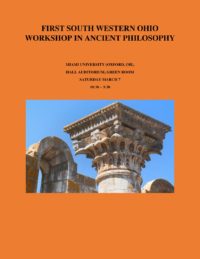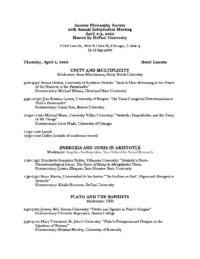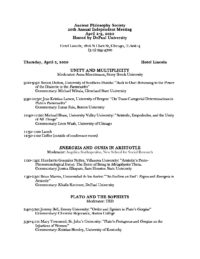
Plato’s Republic for Today, April Event





BOOK PANEL:
IMMIGRANTS AND OTHERS IN ANCIENT ATHENS
Moderator and Respondent: Emanuela Bianchi, New York University
Demetra Kasimis, University of Chicago
The Perpetual Immigrant and the Limits of Athenian Democracy (Cambridge University Press)
Rebecca LeMoine, Florida Atlantic University
Plato’s Caves: The Liberating Sting of Cultural Diversity (Oxford University Press)
Organizer: Michael Naas, DePaul University
Saturday, March 20, 2021; 2:00-3:30 CST
Pre-Register: https://depaul.zoom.us/meeting/register/tJMqf-mqqDoiHtaKuHnXePVrUjHYvK0z-DZL
ANCIENTS AND ANCIENTS:
LATIN AMERICAN, CHINESE, & GREEK THOUGHT
Moderator and Respondent: Alejandro Vallega, University of Oregon
“Puriy and Instilled Sense”
Omar Rivera, Southwestern University
“Poi kai Pothen; Wandering Philosophers in Ancient Greece & Early China”
Rohan Sikri, University of Georgia
Organizer: Sean D. Kirkland, DePaul University
Saturday, April 10, 2021, 10:00-11:30am CST
Pre-Register: https://depaul.zoom.us/meeting/register/tJUrdOiorjMtG9RlqO5KeJeXbfvzMVP4b3o0
PLATO AND ARISTOLE ON THE POLIS AND XENOI
Moderator and Respondent: Lydia Winn, Boston College
“Athens as a Foreign City in Plato’s Menexenus”
Etienne Helmer, University of Puerto Rico
“Apolis: Ostracism in Aristotle’s Politics”
Micah Trautmann, Boston University
Organizer: Will McNeill, DePaul University
Friday, April 30, 2021, 2:00-3:30pm CST
Pre-Register: https://depaul.zoom.us/meeting/register/tJApdeutrDsjGtxArqC1h8lqe9FMFcxU_y9h

Who is Socrates? While most readers know him as the central figure in Plato’s work, he is hard to characterize. In this book, S. Montgomery Ewegen opens this long-standing and difficult question once again. Reading Socrates against a number of Platonic texts, Ewegen sets out to understand the way of Socrates. Taking on the nuances and contours of the Socrates that emerges from the dramatic and philosophical contexts of Plato’s works, Ewegen considers questions of withdrawal, retreat, powerlessness, poverty, concealment, and release and how they construct a new view of Socrates. For Ewegen, Socrates is a powerful but strange and uncanny figure. Ewegen’s withdrawn Socrates forever evades rigid interpretation and must instead remain a deep and insoluble question.



The Ancient Philosophy Society is holding a virtual seminar on Dorota Dutsch’s book Pythagorean Women Philosophers: Between Belief and Suspicion on Friday, January 29th. See the attached flier for further information. We look forward to seeing you there!




Conference Announcement
We are very much looking forward to hosting the Ancient Philosophy Society here in Chicago from April 2nd-5th, for its 2020 Annual Meeting. The program promises four days of stimulating talks.
A block of rooms has been reserved for April 1st-5th at the Hotel Lincoln, 1816 N. Clark St., Chicago, IL 60614, 312.254.4700. There is a reduced conference rate of $169/night. To request the conference rate, ask for “DePaul University Ancient Philosophy Society” and do so on or before March 5th.
https://www.hyatt.com/en-US/group-booking/CHIJL/G-ARTS
A more affordable option would be the Getaway Hostel, 616 W. Arlington Pl., Chicago, IL, 60614, 844.929.5380, which is an approximately 20 minute walk or 5 minute bus ride from the Hotel Lincoln, where most of the conference events will take place.
The registration fee for the conference is $75, with a reduced rate of $40 for students. This must be paid by all participants prior to attending the conference. Also, please do note that all conference participants are expected to have paid their annual APS dues for 2020.
And we encourage you to register for and attend the Saturday Night Banquet at the Alhambra Palace, 1240 W. Randolph St., Chicago, IL 60607. The banquet will include a two-hour open bar and a buffet dinner of sumptuous Mediterranean cuisine, with many vegetarian options. And it will feature, on the Alhambra stage, the celebratory panel, Twenty Years of the APS: Vital Themes and Questions, with papers by Jill Gordon, Drew Hyland, and Rob Metcalf.
The registration fee and the banquet fee, as well as APS annual dues, can be paid through the Philosophy Documentation Center, here:
If your paper has been accepted to the conference, you may be eligible for one or both of the following Ancient Philosophy Society prizes—the Emerging Scholar Prize and the Diversity Prize. Please contact us at APS2020@depaul.edu to self-nominate by February 1st, 2020.
Finally, we will be sending along a digital copy of the conference proceedings in the next week or so. Don’t hesitate to contact us if any questions or concerns arise. See you all in April!
Best regards,
APS 2020 Conference Hosts
Sean D. Kirkland, Will McNeill, and Michael Naas

CALL FOR PROPOSALS
MIAMI UNIVERSITY (OXFORD, OH), HALL AUDITORIUM, GREEN ROOM
SATURDAY MARCH 14

Submit an abstract (150-200 words) to philosophy@miamioh.edu
Format: 15 minutes for presentation followed by a 30-minute discussion.
Deadline February 15

Edited by Emanuela Bianchi, Sara Brill, and Brooke Holmes
Greco-Roman antiquity is often presumed to provide the very paradigm of humanism from the Renaissance to the present. This paradigm has been increasingly challenged by new theoretical currents such as posthumanism and the “new materialisms”, which point toward entities, forces, and systems that pass through and beyond the human and dislodge it from its primacy as the measure of things.
Antiquities beyond Humanism seeks to explode the presumed dichotomy between the ancient tradition and the twenty-first century “turn” by exploring the myriad ways in which Greek and Roman philosophy and literature can be understood as foregrounding the non-human. Greek philosophy in particular is filled with metaphysical explanations of the cosmos grounded in observations of the natural world, while other areas of ancient humanistic inquiry – poetry, political theory, medicine – extend into the realms of plant, animal, and even stone life, continually throwing into question the ontological status of living and non-living beings. By casting the ancient non-human or more-than-human in a new light in relation to contemporary questions of gender, ecological networks and non-human communities, voice, eros, and the ethics and the politics of posthumanism, the volume demonstrates that encounters with ancient texts, experienced as both familiar and strange, can help forge new understandings of life, whether understood as physical, psychical, divine, or cosmic.
Contributors: Claudia Baracchi, Emanuela Bianchi, Sara Brill, Adriana Cavarero, Rebecca Hill,Brooke Holmes, Miriam Leonard, Michael Naas, Ramona Naddaff, Mark Payne, James I. Porter, Kristin Sampson, Giulia Sissa
https://global.oup.com/academic/product/antiquities-beyond-humanism-9780198805670?cc=us&lang=en&#